Sarah Arzberger
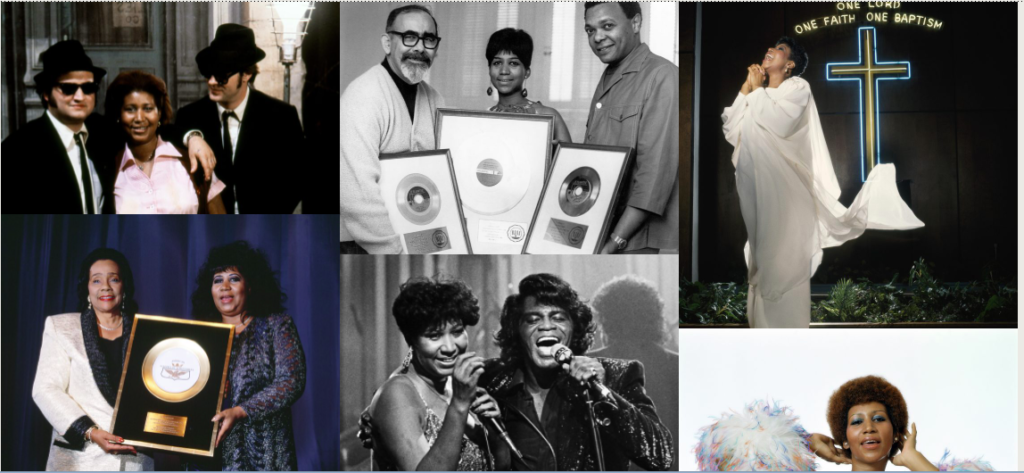
The legendary Aretha Franklin was born March 25th, 1942 in Detroit Michigan. She is best known as the Queen of Soul. Some of her accomplishments are 18 Grammys, the first woman in the Rock and Roll Hall of Fame, 73 songs that charted in the Hot 100 (a record that lasted 40 years), her voice was deemed to be a natural resource and was inducted into the Michigan Women’s Hall of Fame. But not only was Aretha a music icon, but she also used her talent and platform to help fight in the Civil Rights Movement. Dr.Bernice King called Franklin a “Shining example, of how to use art to support social change.” It’s not a surprise that she would become involved with the Civil Rights Movement because her father Clarence LaVaughn Franklin was close friends with Martin Luther King and was the one who orchestrated the 1963 Detroit Walk to Freedom which is the second-largest demonstration for civil rights in the US. As a teenager, Aretha would sing in the choir at her father’s Church and at 14 she released her first gospel album. At the age of 16, she went on tour with Martin Luther King which she would sing Gospel Music. It wasn’t until the 1960s when she was 18 did she transition from sacred to secular music with her father’s blessing. It wasn’t long after that she started producing hit after hit.
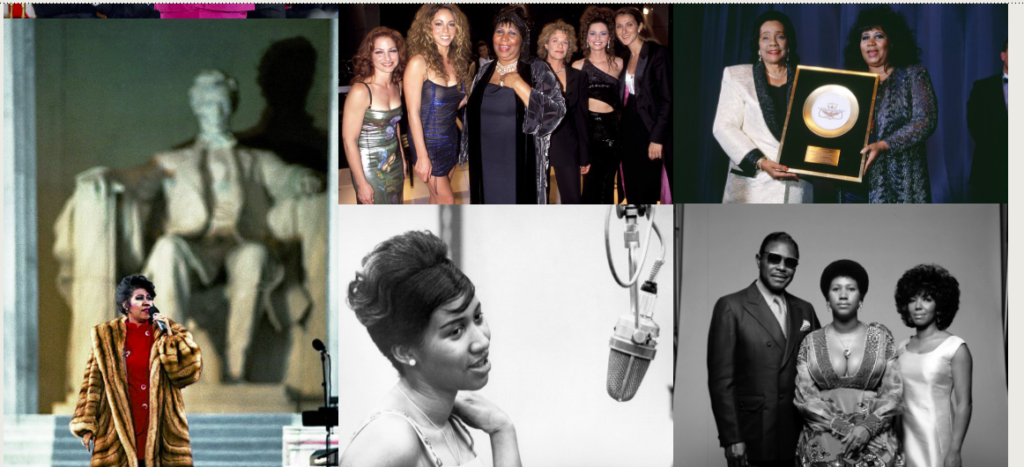
“R-E-S-P-E-C-T, find out what it means to me” is A classic, a hit, an anthem, and one of the most well-known songs on the planet. Respect by Aretha Franklin is a song where you read the lyrics and the tune starts to play in your head. For me, I know the song Respect as the song that taught me how to spell the word respect but it’s actually an anthem for the racial and gendered political movement. The song was originally written and recorded by Otis Redding in 1965 but had a completely different meaning. The meaning of the song was from a male perspective. Otis sings about how he should have respect from his women when he returns home after a long day at work. He uses names like a little girl, baby, and honey. And mentions how all the money goes to her but there is no respect. Aretha then takes Otis’ song and turns it upside down. She said “Well, I just love it. Of course, that became a mantra for the civil rights movement. ‘Respect’ is just basic to everyone: everybody wants it […] Everybody wants and needs respect. It’s basic to mankind. Perhaps what people could not say, the record said it for them.” In 1967 Respect became an anthem of the Civil Rights campaign and Feminist Movement. In 2016 Aretha told Elle Magazine “she was stunned by its success and it was the right song at the right time.” One thing I found fascinating was it didn’t matter how famous Aretha became she never lost sight of her sense of activism. It was in her contract to never play to a segregated audience. Not only did her music shine a ray of light on the Civil Rights Movement but also helped with musicians seeking royalties. The New York Times article “ How Aretha Franklin’s ‘Respect’ Became a Battle Cry for Musicians Seeking Royalties”, states that “In recent years, “Respect” has also become a battle song in a fight over digital rights. Laws passed in the 1990s let performing artists collect royalties from internet and satellite radio, but songs were exempt if they were recorded before a change in federal copyright law took effect in 1972.” This is just a prime example that Aretha Franklin not only helped during her time but her music, later on, got to help other musicians obtain royalties for their music.
Besides writing amazing hits and anthems, Aretha helped support the Civil Rights Movement in other ways. She played and held free concerts, paid for many Civil Rights tours and campaigns while Martin Luther King jr was alive, and housed activists and helped them fundraise. Many would say that she was not just an entertainer but an inspiration. According to Quartz web article “When Aretha Franklin Offered to Post bail for Angela Davis” states “reporting her intention to post bail for the black power activist Angela Davis, who was being held in prison in connection with the escape attempt of prisoners from a California courtroom, in which several people were killed. (She would eventually be acquitted.) At a time when Davis was called a “dangerous terrorist” by President Richard Nixon, Franklin didn’t hesitate to risk her reputation and money to support the now-legendary civil rights activist.” Whether it was $100,000 or $250,000 Aretha Franklin did not care and just wanted to do what was right despite what others would think, especially her father. Aretha said My daddy (Detroit’s Rev. C.L.Franklin) says I don’t know what I’m doing. Well, I respect him, of course, but I’m going to stick by my beliefs. Angela Davis must go free. Black people will be free. I’ve been locked up (for disturbing the peace in Detroit) and I know you got to disturb the peace when you can’t get no peace. Jail is hell to be in. I’m going to see her free if there is any justice in our courts, not because I believe in communism, but because she’s a Black woman and she wants freedom for Black people. I have the money; I got it from Black people—they’ve made me financially able to have it—and I want to use it in ways that will help our people.” Throughout her life, Aretha Franklin remained a prominent voice and face for African American Civil Rights.
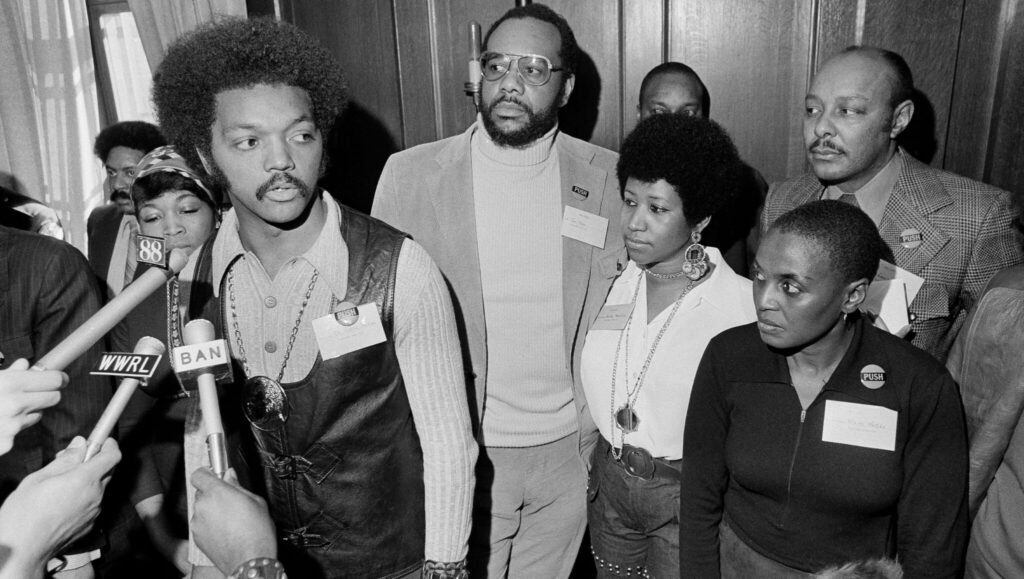
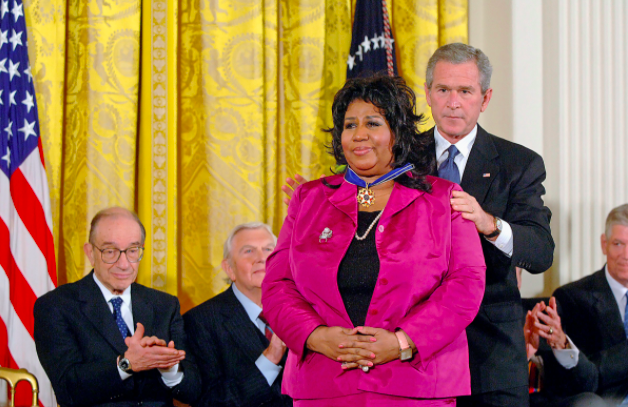
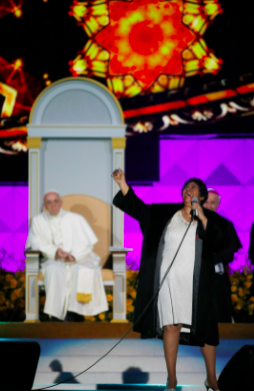
August 16, 2018, is a day that the world lost a legend. Unfortunately, Aretha Franklin passed away from an illness in her pancreas at the age of 76 in Detroit Michigan. Although she may not be here, her music will keep her spirit alive. One of her close friends, President Barack Obama said “Aretha helped define the American experience. In her voice, we could feel our history, all of it and in every shade—our power and our pain, our darkness and our light, our quest for redemption and our hard-won respect. May the Queen of Soul rest in eternal peace.” Everyone remembers Franklin’s work in the music industry but her work in the Civil Rights Movement has changed the world and helped so many people. That is why Aretha Franklin’s art has helped make a huge difference in many different movements.
Work Cited
BBC. “Aretha Franklin: The Sound of the Civil Rights Movement.” BBC News, BBC, 16 Aug. 2018, https://www.bbc.com/news/world-us-canada-45216581.
Josephs, Brian. “Aretha Franklin Rose with the Civil Rights Movement.” Billboard, 6 Sept. 2018, https://www.billboard.com/music/pop/aretha-franklin-civil-rights-movement-8470735/.
Lang, Cady. “Aretha Franklin Had an Impact on the Civil Rights Movement.” Time, Time, 16 Aug. 2018, https://time.com/5369587/aretha-franklin-civil-rights/.
Merelli, Annalisa. “When Aretha Franklin Offered to Post Bail for Angela Davis.” Quartz, Quartz, https://qz.com/quartzy/1356841/when-aretha-franklin-offered-to-post-bail-for-angela-davis/.
Ritz, David. “Aretha Franklin.” Encyclopædia Britannica, Encyclopædia Britannica, Inc., https://www.britannica.com/biography/Aretha-Franklin.
Williams, Gracie. “The Story behind the Song: Aretha Franklin’s Mega-Hit ‘Respect’.” Far Out Magazine, 28 Apr. 2021, https://faroutmagazine.co.uk/aretha-franklin-respect-story-behind-the-song/.